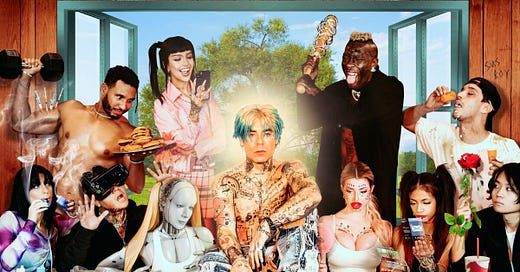God Save the Teen
Mod Sun
2023
by Josiah Hughes
God Save the Teen is a perfect album title. It’s eye-rollingly stupid on the surface and feels both obvious and unbelievably annoying — the kind of thing I desperately wish I had thought of. It also speaks directly to the current moment of punk cosplay happening throughout culture, from Disney+ releasing a Sex Pistols biopic to the army of balding 30- and 40-year-olds in Travis Barker’s circle, wearing Grailed punk jackets with G.I.S.M. patches and listen to Hawthorne Heights while they drive Land Rovers to get vegan food. But beyond that, the title is also a cry for help — in fact, the teens do need saving. Culturally, aesthetically, emotionally, spiritually — the world they’re inheriting is a mess. And Mod Sun is here to, well, at least point that out.
If anything, Mod Sun is the perfect candidate for this conversation. Born Derek Smith, he’s spent his 35 years on earth rolling through subcultures and absorbing little bits of their energy. He’s been a Victory-signed metalcore drummer, an Alt Press post-hardcore guy, a cringe posi-rapper, a member of a YouTube throuple, a recovering addict, a terrible painter, a self-published social media friendly poet, and, in this current cultural moment, a go-to mall punk songwriter.
His more successful, much taller friend Machine Gun Kelly has sold out arenas with his world-weary nihilism, and despite the haters, MGK has since spawned red-carpet looks that elevated him to be aesthetically punk in a sort of sophisticated anime way. Mod Sun is doing something different. His strange combinations of colourful hair dye, JNCOs and the natural ravages of age make him look like Ariel Pink had he been forced to make up for his Jan 6 crimes by going undercover to infiltrate an emo night crime ring. He’s a sort of oogle-clown prince of pop-punk.
Oh, by the way, his name is an acronym for “movement on dreams, stand under none.” He sort of seems like the guy who complains that the punk scene is too cliquey and everyone’s supposed to be standing for individuality, so why do they all look the same? His personality is a strange combination of self-awareness and narcissism (or, as he calls it, “delusional confidence”). The God Save the Teen album cover has so many visual ideas on display that you almost forget that he’s placed himself as the Christ figure at this face-tattooed-influencer last supper.
Truthfully, these descriptions that sound like flaws often work in Mod Sun’s favour. His main mantra, which he repeats on the regular, is that he decided to “remove the bone of embarrassment” from his body. As we know from the Marilyn Manson myth, having a bone removed can make you a new kind of masturbatory, and Mod is certainly guilty of self-mythologizing (if not self-sucking). But his self-aware lack of self-awareness allows him to belt out one hell of a hook.
God Save the Teen was apparently an entirely different set of songs before Mod decided to scrap all his singles and deliver something he thinks of as an album experience, a delicious pretension that speaks to a different time, when people pretended to care if an album was “cohesive.” The listening experience doesn’t really pan out like that, though there are some loose musical motifs that surface throughout.
If God needs to save the teens (and there’s no question He does), and Mod is presented as a messiah on the cover, that could explain how much of the album sounds like sanitized Christian pop-punk. The album opens with “Eyelids” and “Revenge,” two songs that sound like a youth pastor’s idea of punk rock (a.k.a. All-American Rejects and the Police). But Mod’s embarrassmentless delivery means he sells these songs well, to the point where the choruses feel huge even when they aren’t.
I forgot to mention that Mod is also engaged to Avril Lavigne, and their punky uwu romance gets its own little section on the album without overpowering it as a whole. That starts with “Avril’s Song,” an acoustic semi-ballad that gives us the first taste of Mod Sun’s adult contempo strengths to come (keep reading). It’s also a perfect example of his weird half-clever lyricism. In the past he’s sung things that feel subversive, even if they’re not subverting anything (see: “Rich Kids Ruin Everything,” whose video sees him add a graffiti’d “i” to the word “run,” as if “Rich Kids Run Everything” was a phrase that needed dismantling). Here, he builds a song around the refrain “She blew me a kiss / And I didn’t wanna blow my brains out anymore.” It’s hardly smart enough to say even once, let alone repeat. But he sells it.
“Avril’s Song” serves as a siren to invited Mod’s betrothed onto the record, and the lovers share vocals on the 6/8 swooner “Shelter.” Despite some vague punkery (“You safety pin me back together”), the song sounds 100 percent like a worship song, something they’d probably play at Bethel after everyone was done socializing for the 10 minute break before the sermon. But they sound right at home in that context.
Avril and Mod’s relationship is seemingly far squishier than MGK and Megan Fox’s up-and-down romance or Kravis’s endless parade of public fluid-swapping. But they’re still a punk/alternative power couple, which means the Avril section perfectly segues into a song called “Courtney Fucked Kurt.” Now, it goes without saying that a song with that title is going to be… divisive, but this is particularly egregious with its Kemper plugin-ed retro punk sound, generic hardcore riffing and lyrics “Courtney fucked Kurt and Sid killed Nancy.” It’s clear that he’s trying to insinuate Courtney fucked Kurt over by allegedly hiring a hit, but he doesn’t quite have the guts to say it.
Still, his lack of embarrassment bone somehow makes it work — he chastises people as they “put a leather jacket on and think that [they] are so scene” and spend their time “looking up YouTube videos about anarchy.” In its arch yet strangely affecting breakdown, the message of the song becomes clear — don’t romanticize self-destruction, but choose to live your best life instead. Honestly? He’s not wrong.
“Courtney Fucked Kurt” is truthfully the closest thing to a punk song on God Save the Teen, for better or worse. But there are other moments more worthy of a skip. “SOS” feels like one of a million equally forgettable rock songs called “SOS,” and it doesn’t do much until some sort of evil Halsey clone called “Royal & the Serpent” shows up to presumably fulfill someone’s contractual obligation to someone else. “Single Mothers” is a cute acoustic ditty but he could have just as easily emailed it to his mom on Mother’s Day. And “Wolves” is the closest thing to a true “album” track in that it has a fake Cure/U2 riff that repeats forever and only inspires you insofar as you’ll make a mental note to never listen to it again.
But we’ve yet to dig into Mod and God’s greatest strengths, which are the adult alternative radio rock moments. If you’ve paid any attention to the album roll out at all (and I highly doubt you have), you’ll have noticed that Mod covers the Goo Goo Dolls’ “Iris.” What could have been a shoo-in nü-emo belter or a stripped-down sap fest is actually neither, instead offering a somewhat faithful replica of the original with the prerequisite AutoTune and studio trickery.
The reason “Iris” doesn’t erupt in an explosion of pandering is because Mod’s approaching it authentically, and his unembarrassed ass was actually tailor-made to deliver this style of litely rocking pop music, as he proves elsewhere. “Drive” is a great lil ditty with jaunty acoustic guitars and a nice bounce to it, not unlike Train. Better yet, “When We’re Dead,” sequence right beside “Iris,” sounds like it’s trying to be an Oasis song but coming through like Recovering the Satellites-era Counting Crows. That’s a tough vibe to pull off, but maybe Mod Sun — a self-obsessed poetry boy with funny hair and punk clothes — is just the modern-day Adam Duritz in a Dead Boys shirt. They do both want to be Bob Dylan.
Finally, God Save the Teen closes with “Delusional Confidence,” a fairly corny ballad built on a piano loop and confessional lyrics about Mod’s insecurities which are, specifically, that he isn’t insecure enough: “I love my voice every time I sing, but the world tells me I’m a poser,” he sings. As if that weren’t enough, the song eventually erupts into the album’s first moment of rapping, and Mod sounds precisely like Macklemore at his most “not gay” as he spits bars about how fucked up society is nowadays:
Fifteen minute friendships covered in cheap conversations
Filtered selfies, sippin' out of Starbucks straws
While the ring-lights shine bright enough to cover up all our flaws
Strawberry vapes just so we can enjoy the taste
Of freedom and all this glory while we slowly suffocate
Disconnected from reality but the Wi-Fi is exceptional
The corner store candyman just laced it all in Fentanyl
The bars continue, then the music cuts and he says, nonchalantly, “God save the teen.” It’s terrible. It’s poignant. It will give you chills, and you won’t know whether they’re borne of embarrassment or profundity.
Sometimes it feels like millennials have contributed far less to the classic album canon as our predecessors. Because I’m a media millennial myself, that’s the kind of thing I do. We track trends and movements, following the curve to try to stay on top of it all, even as we’re becoming woefully irrelevant. That’s why there were so many unbearably clueless “in and out” lists tweeted out at the start of the year, and that’s why there are so many people pushing 40 and trying to dissect the minutiae of indie sleaze instead of making an appointment at the bank or getting a physical.
In a sense, that’s why Mod Sun’s God Save the Teen is a triumph of millennial content, if not a great rock album. So much modern art is pastiche, and Mod Sun has inadvertently captured the mess of it all by expanding the horizons of his personal pastiche to not just “punk” or “emo” but also waiting-room radio rap, modern country, worship music and adult alternative. This is an earnest attempt to bottle all of the influences of the first distracted internet generation without trying to really make sense of anything. It’s music created by someone who lived through all three movements of retro-bait, touching on things that only ‘80s, ‘90s and ‘00s kids can remember. It simultaneously feels focus-grouped and unfocused.
A 35-year-old man releasing an album called God Save the Teen might seem like a terrible idea, but it’s not really an album for teens anyway — it’s an album for people who have never grown up. Yes, it all comes back to that album title: as your Zoom therapist hurriedly tells you despite not remembering your name, there’s a teen inside of you that likely needs saving. That’s feels like an embarrassing thing to admit. But as Mod Sun proves, it’s cool to be embarrassing.







